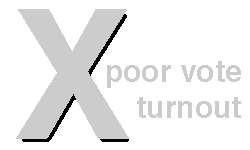the welfare of taxpayers
by Breezy Brian Gregg and Mac Walker August 20, 2014
The Leveller
online publication by poor vote turnout
Why is the welfare of the taxpayers always referenced in news stories about government waste? The taxpayer frame of reference distorts the picture and does not give the true story. If government revenue is wasted due to bad policy or bad practices it hurts all Canadians not just the taxpayers.
Implied in the outrage so often expressed regarding the wasting of the so called “taxpayers’ dollars” is the idea that taxpayers still somehow own the money they pay in taxes after the taxes have been paid to the government. The thinking is twisted. The dollars that are paid in taxes become the government’s dollars. You cannot make a payment and still claim ownership of the money you paid.
Also implied is the idea that taxpayers deserve and have the right to say how their “tax dollars” should be spent and that the more taxes a person pays the more say they should have in government business. Not! In a democracy that is not right. When money can buy you power over government decisions, democracy does not exist.
This term “the taxpayer” is used to justify further lowering of tax rates and to promote austerity measures (cutting services), both of which mean a loss to the welfare of the non taxpayers: the children, the sick and the old, and the disadvantaged.
How the use of the term “the taxpayer” furthers an agenda of tax cuts and austerity is as follows: Very little is perfect. Inevitably and over and over again someone in government screws up and wastes. When this news is reported there seems to be a convention that this report of the event must have accompanying editorial comments about how this is unfair to “the taxpayer”. There are so many news reports of this type that the details of each case of government waste become a blur and all that is left in the public mind is the common editorial comment about unfairness to “the taxpayer”.
Repetition establishes a belief about injustice to this select group – the taxpayers – and establishes the grounding for arguments to restore fairness to the group by lowering tax rates. The problem that this leaves a shortage of funds for public service programs is easily taken care of by the “necessary” cuts to services.
If we want to understand the workings of government and be able to direct it to be fair to all people there is no point in using the term “taxpayer” nor any point in talking about “taxpayers’ dollars”. We have to speak with terms that represent reality not terms that are mythical or ideological.
